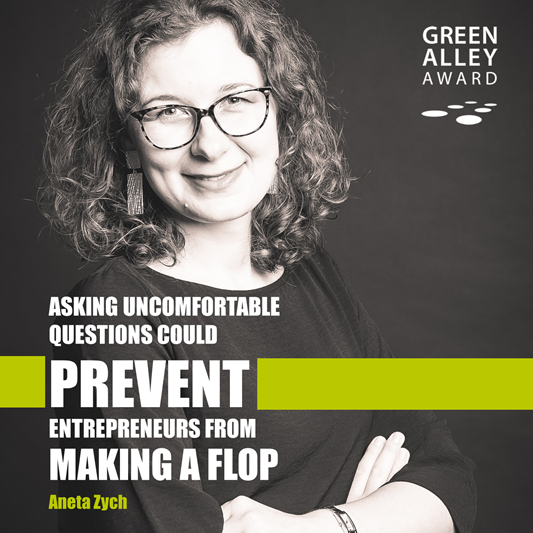
Meet our experts! Today: Aneta Zych!
Our startups are, of course, experts for the circular economy. Nevertheless, they could also profit from exchange with other experts. That's what we are offering our Green Alley Award finalists in our so-called expert sessions! In these sessions, #circulareconomy as well as #startup experts provide hands-on advice and the startups will get the possibility to enlarge their network and to profit from knowledge of other experienced professionals.
Aneta is EPR Consultant and Project Manager at Landbell Group and brings in 14+ years of professional experience in various industries: conventional and renewable energy, recycling, manufacturing and even advertising. Read in the interview about her advice for startups.
What is your professional background and how will it help you to be a startup advisor for the Green Alley Award finalists?
I bring in 14+ years of professional experience in various industries: conventional and renewable energy, recycling, manufacturing and even advertising. I worked for a corporation, middle-sized companies and a very small enterprise, in private and public sector. I advised to foreign companies willing to grow their business and start production in my home country as well as helped small Polish companies go international. On top, for the past 4 years I have been working for Landbell Group, which, despite its impressive size and history, is still “starting up” in new markets and new fields of the circular economy! Hopefully, this various background makes me a good advisor for the Green Alley Award finalists.
Most of the things you have to consider when starting a business, you don’t learn in any school. So, generally speaking, in what way could entrepreneurs profit from mentors or advisors like you?
I have never started a business on my own, but I have seen businesses shrink – I have witnessed mistakes made and chances missed by a few companies I worked for. I believe that careful market assessment and humbleness are crucial. Of course, self-confidence and the belief that one has a great product or service is necessary to succeed, however, these need to be supported with facts and figures. In the role of a Green Alley Award mentor, I see myself as an inquisitive person asking uncomfortable questions that could prevent entrepreneurs from making a flop.
When founding a startup one can have the perfect idea and the best conditions but still fail to be successful. As execution is key, what are you as an expert looking for in an entrepreneur, his team and his business idea?
I am mostly interested in personal motivation. What has driven the entrepreneur to come up with a particular idea? Does it come from his or her interests, values and beliefs? Is the team committed to work hard for several months without the guarantee of success and revenue? Has the team invested their own funds to develop the business?
The Green Alley Award is all about circular startups. In your opinion, which are the key challenges for a circular economy in Europe?
I think the biggest challenge for circular economy (not only in Europe but all over the world) is the make-take-dispose culture. We produce, consume and dispose of too much. Even though environmental awareness of consumers increases, there is still not enough demand for products coming from recycled materials. Also, it is my impression that products made from recyclate are often unjustifiably far more expensive than those made from virgin materials, which discourages consumers from changing their purchasing habits.
If you had the chance to start your own business, what kind of startup would it be?
My own startup would definitely be something where I could combine my two passions: cross-country skiing and love for nature. I only fear that with the climate change and winters becoming a rarity this startup would not be very successful…